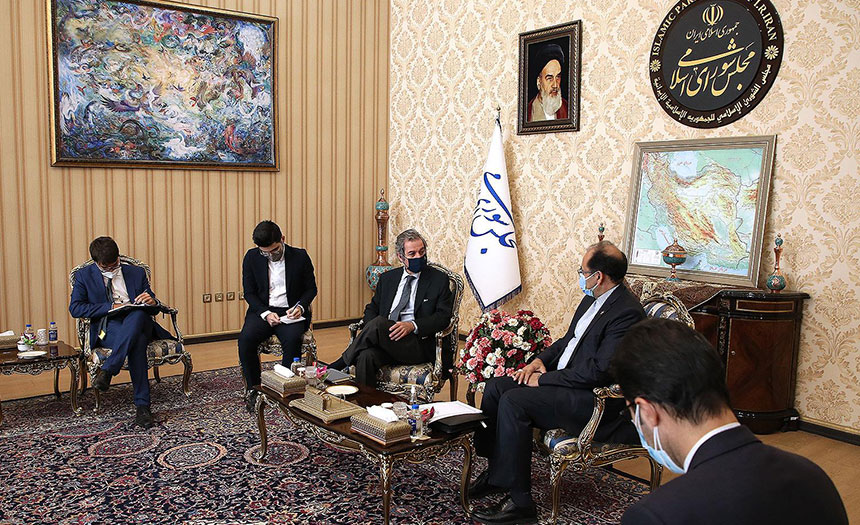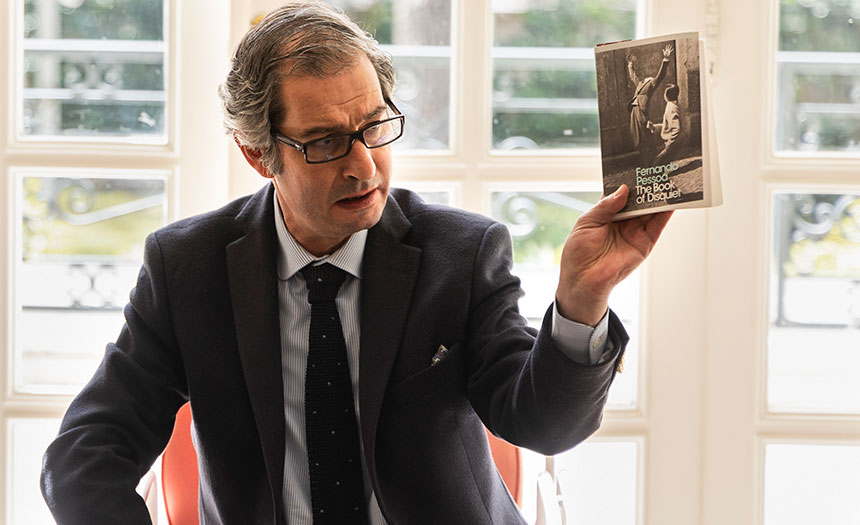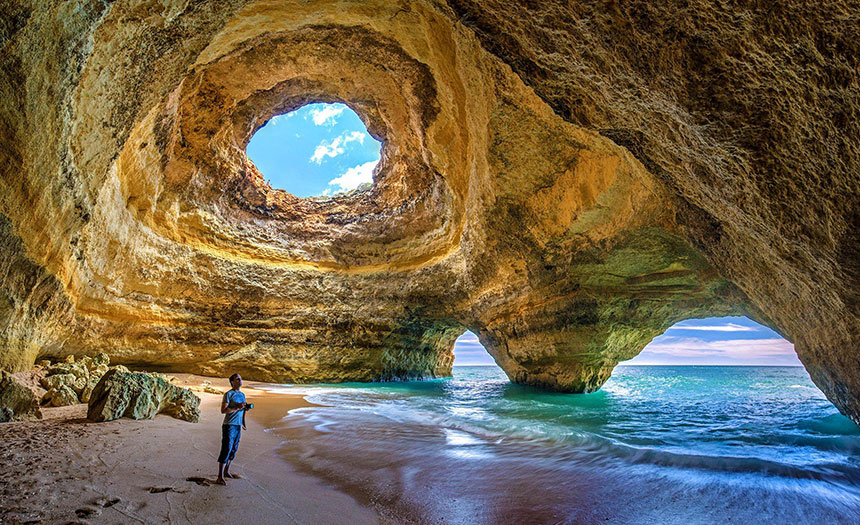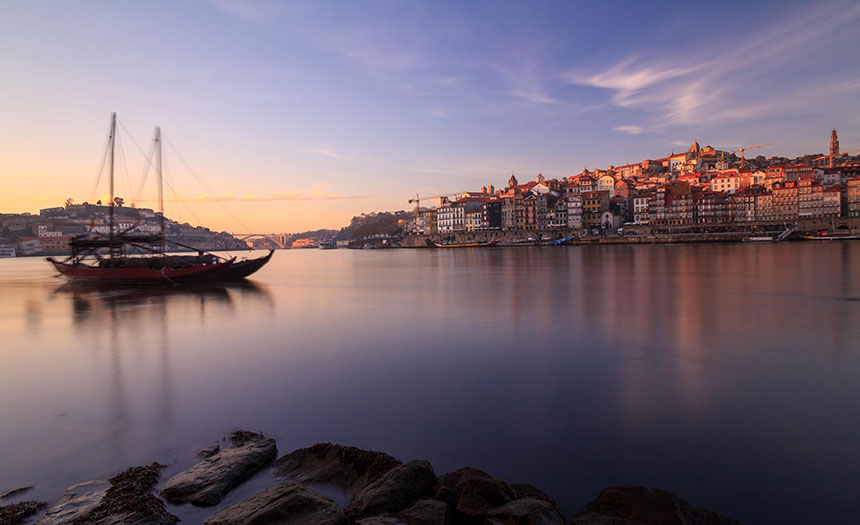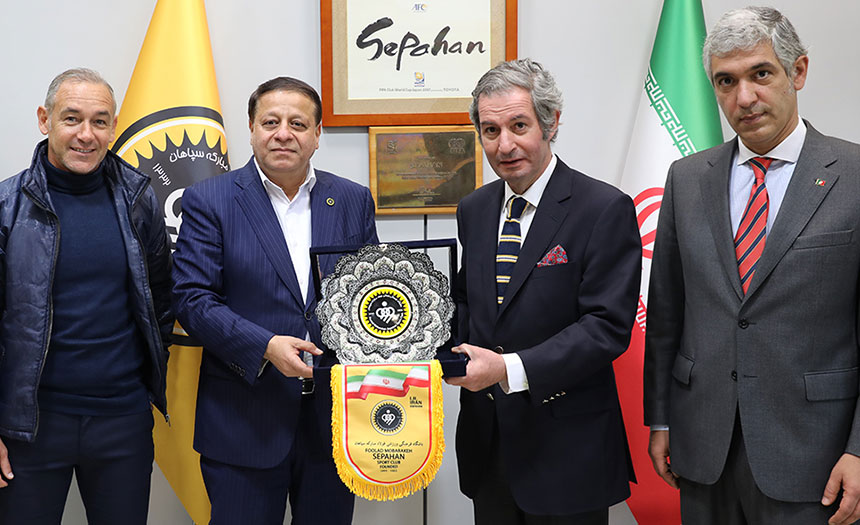By: Trends Editorial Team
Carlos Cost a Neves is Ambassador of Portugal to Iran since July 2020, having previously served as Deputy Head of Mission in the Embassy of Portugal in Madrid, Spain, as Consul-General in Luanda, Angola, and in the Permanent Representation of Portugal to the European Union, in Brussels. Meanwhile he has been, among other functions, diplomatic Counsellor of President Jorge Sampaio and Director for International Organizations in the Ministry for Foreign Affairs of Portugal. He has a Master’s degree in Modern Literature from the University of Lisbon and a Master in International Affairs from the Diplomatic School of Spain.
a Neves is Ambassador of Portugal to Iran since July 2020, having previously served as Deputy Head of Mission in the Embassy of Portugal in Madrid, Spain, as Consul-General in Luanda, Angola, and in the Permanent Representation of Portugal to the European Union, in Brussels. Meanwhile he has been, among other functions, diplomatic Counsellor of President Jorge Sampaio and Director for International Organizations in the Ministry for Foreign Affairs of Portugal. He has a Master’s degree in Modern Literature from the University of Lisbon and a Master in International Affairs from the Diplomatic School of Spain.
Thank you so much for giving Trends this exclusive interview despite your busy schedule, we are very grateful. If you were to summarize the state of affairs between Iran and Portugal, in terms of political relations, as well as trade activities and cultural exchanges, how would you describe them?
Our countries have on an overall basis quite a constructive framework of relations, which is mutually acknowledged as such. We have political consultations once a year and our Foreign Ministers have been in touch several times over the years, including during the recent Portuguese Presidency of the EU.
Portugal being traditionally a trade country, I have to say that the current commercial exchanges are far from reaching our considerable mutual capacity, which is a permanent incentive to go after. During my meetings with the Iran Chamber of Commerce and the Chamber of Commerce of Isfahan we could identify some priority areas that I will mention further on.
On culture, despite the asset of an ancient history of more than 5 centuries of interrelation, we also have much to do. As an example, we have one of the first agreements on Culture and Sports signed by the Islamic Republic of Iran.
The World Cup quarter-final ties: Morocco vs Portugal completes the schedule
The celebration of the five hundred years of bilateral relations a few years ago, was an important and symbolic moment. It was the reason for the visit of the Portuguese Secretary of State for Culture to Iran in 2015. In October 2020 I had the privilege of participating in a seminar and excellent exhibition organized by the Iranian Embassy in Lisbon in cooperation with the National Archives of Portugal and our Diplomatic Institute.
It was also an occasion for bringing together Iranian and Portuguese historians, sharing views on our common legacy. Remnants of Portuguese castles can be found all over the Persian Gulf coast, from Kish Island to Chabahar. The past shows that we had conflicts, but we have also been allies at various times. The conquest of Hormuz at the time of Shah Abbas, in 1622, marked the decline of our presence in the Persian Gulf, while Safavid Persia regained its ascendant position in the region.
Today, we must give value to these historical links, which are referred to in every symbolic moment in our bilateral relations, as was the case when I presented credentials here to the President of the Islamic Republic of Iran.
But much more important is to develop current ties. In Lisbon there is a flourishing Centre for Iranology in the University of Lisbon. Here in Iran, I’m looking forward to negotiating a protocol for the creation of a Center of Portuguese Language in one of your top universities.
Are there any major cultural/artistic activities between the two countries planned for 2022?
An important connection between Iran and Portugal is that we are both countries of poetry. A culmination in our relations in the field of Culture has been the publication, just in February, of the bilingual edition of the “Rubaiyat” of Fernando Pessoa, the greatest Portuguese poet of the modern era, and one of the most important European literature figures of the 20th century. These verses were inspired by his admiration for the great Persian poet Omar Khayyam. The book is a magnificent example of a happy link between our two literary and poetic traditions showing, once more, that poetry can also forge connections between different peoples and nations. Some other translations of Portuguese authors are in the pipeline as well.
There is also a festival of Portuguese films in Tehran that we want to promote with the Portuguese “Cinemateca”, maybe by the end of this year or at the beginning of 2023, and also another festival of Iranian cinema in Lisbon currently being planned.
These, like other initiatives, such as the commemoration of the 500 years of diplomatic relations or the presentation of the Rubaiyat of Pessoa in Lisbon and Porto, were also strongly supported by the Embassy of Iran in Portugal. Your ambassador in Lisbon is, indeed, an important interlocutor of mine. And this is a good way of working.
Please tell our readers about Portugal, its history, people, art, culture and economy as well as its touristic attractions. Portugal has been one of the most influential nations for centuries when it comes to world exploration and discoveries, as well as being a pioneer in maritime innovation. What do you contribute this extrovert quality of your country to?
Indeed. Our history is part of our identity and inspires the Portuguese. In my view the spread of language is one of the main legacies of that past. Portuguese language is spoken in nine countries on four continents. It is a language of culture, technology and business that is still expanding worldwide. Allow me to add some other pieces related to our portrait today.
Multilateralism is one of the main pillars of our foreign policy. Perhaps for the same reason, the Secretary General of the United Nations, António Guterres, is a former Prime Minister of Portugal. Other Portuguese are also in charge of important international bodies, such as José Manuel Durão Barroso, former Prime Minister and also former President of the European Commission and the current President of GAVI – the vaccine alliance, or António Vitorino the Director General of IOM, the UN Migration body. My country is also pushing for solutions for some very relevant global challenges. Let me give you an example. In June of this year Lisbon is hosting, together with Kenya, the UN Ocean Conference. This is an area where we are particularly active since a long time ago. Part of the portrait of Portugal today is also conveyed by our successful bet on renewables. More than 60% of our energy comes from renewable sources.
Portugal and Brazil: Two Nations Bound by One Language
On tourism we have an old tradition and a very competitive profile, combining cultural, leisure, gastronomic and ecological, just to give you a picture. Individual Portuguese cities and the country as a whole, have recently received several awards for tourism excellency, which is both a recognition and an incentive to do even better. This sector has been the largest exporting economic activity in the country, being responsible for 51.5% of exports of services and 18.6% of total exports, with tourist revenues recording a contribution of 8.2% in Portuguese GDP . Continued improvement of the adopted tourism policy is based on five main pillars: valuation of the territory, boosting of the economy, enhancing knowledge about the country, generating networks and connectivity, and projecting Portugal (www.cantskipportugal.com/en/) . As a result of our expertise in tourism, some Portuguese are on top positions of the hospitality industry. In Iran, for instance, Mr. Mário Candeias has been the Managing Director of the five-star Espinas International Hotel for several years.
Portugal is very advanced in several sectors including textile, agri-food, pulp & paper and fishery. These sectors are also not under severe sanctions. Why haven’t we seen any cooperation in those industries between our countries? Is there a chance for Iran and Portugal to cooperate in such areas regardless of the fate of the nuclear negotiations?
You are absolutely right, we are advanced in those areas, but we also have challenging, flexible, technological and competitive companies in education, sea related economy, industrial equipment, environment, automotive industry, forest, renewable energies, tourism, health and life sciences and a unique environment for tech companies. Notwithstanding all these capabilities, I would like to include here a small note about the ZILS, Sines Industrial and Logistic Zone, which is strategically located and is dedicated to the industrial, logistics and service areas. Housing some of the most relevant companies in the country and located close to the deep-sea port of Sines, it has an industrial and logistical area (ZILS) connected to the roadway and rail transport network and the pipelines distribution network.
Portugal has proven to be a reliable and strategic partner for developed and developing countries. Sourcing in Portugal and investing in Portugal are much more than just a trend.
Regarding the Iranian market, the trade relations are ongoing but, as with any other European country, greatly affected by the economic restrictions worldwide. Non-sanctioned areas are by now not only a priority but also an opportunity to satisfy the needs of both markets in a mutually cooperative way.
Portugal has been one of the most popular destinations for Golden Visa applicants. What can you tell us about that? What differentiates Portugal’s GV program from similar ones from other EU countries?
Portugal has been able to attract a wide array of foreign residents thanks to the many advantages it offers. Its warm climate, delicious food, high safety indexes and quality infrastructure provide an excellent quality of life for foreigners to settle in, especially when coupled with the welcoming nature of the Portuguese people.
There are many opportunities to invest in Portugal, including in its burgeoning tech sector. The several steps that have been taken by the Portuguese government to reduce bureaucracy also make Portugal an excellent place to settle and launch businesses. Finally, the strategic geographical position of Portugal is ideal for international-connected world citizens, granting easy access to all of Europe, and fast connections to the Americas and to Africa.
Portugal is ranked as one of the best manufacturing places in Europe. Are there any incentives and services for foreign investors to establish production facilities in Portugal?
Indeed, Portugal has an assertive policy on attracting foreign direct productive investment. As we say, we are open for investment, and there are valid arguments from the investors’ point of view. I don’t want to enter into excessive details but let me give you some figures without being exhaustive.
According to the Organization for Economic Cooperation and Development (OECD), among 68 nations, we are the second most open country to foreign direct investment (FDI). In 2021 we ranked in 20th in FDI Confidence Index and the EY European Investment Monitor considers Portugal as the 10th top destination for FDI in Europe. In addition to these very important stats, we are a safe country that ranks fourth in the Global Peace index and the European Commission Disaster Risk Management assigns Portugal the grade of Very low risk.
Also due to our location, history and culture, another attraction lies in the ability to establish a bridge with the other member states of the European Union and with the Community of Portuguese-speaking Countries, which together represent a market of around 750 million people.
Something that also supports the attractiveness of the country lies in the strong focus on talent. We rank twenty-eighth in the global competitiveness index , among which the eighth place in the language skills stands out (5th in E.U.) as well as the 3rd highest rate of engineering graduates in Europe . With strong broadband and telecommunications connectivity and an integrated transport system for efficient logistics, Portugal is placed as the 21st in the world with better infrastructure, accordingly to the World Economic Forum (2019). All these factors lead Portugal to be an innovative country , that has boosted the emergence of unicorns. I believe that this, by itself, places Portugal on the radar of many investors. In addition, Portugal has an attractive package of investment incentives, and the new Investment Support Program (Portugal2030) is already underway. The available incentives are divided into categories. That is, they can be granted on a financial, fiscal and job creation level.
The type of investment, especially when productive, the location, the creation of jobs, the innovative aspects of the projects and the export capacity, are all factors that support the relevance of the projects and determine the allocation of these resources. AICEP PortugalGlobal is the Portuguese investment and trade agency that has a representation in Tehran within the Embassy, which at an early stage can best assist the setting up process but can also promote direct negotiation with the investors defining a global package that fully satisfies their mutual needs. The implementation and subsequent support are also provided by AICEP.
It is due to all these factors and others, that Portugal is ranked as one of the best places in Europe for manufacturing but also to research and develop, to create and innovate. Having Europe’s largest conference on technologies (Web Summit), held annually in Lisbon, is just a reflection of Portugal’s potential and proven capacity.
Are there any business delegations visiting either side any time soon? If so, in what sector(s) and when?
We’ve had some activity lately. The Portuguese Chamber of Commerce and Industry recently conducted a virtual mission to the Iranian market and some entrepreneurs from Portugal have also visited Iran. The visit of the President of the Portuguese technological park, TagusPark, stands out, as it focused on developing solutions that respond to contemporary challenges in the areas of health, information, and engineering technologies among others. The signing of a protocol with Pardis Technological Park, during the 4th Tech and Innovation Meeting, represents a path forward and a positive sign that will allow both sides to aim for future synergies in these areas where Iran is also well-developed.
Football has been one of the great bridges between Iran and Portugal (our former charismatic and successful national team coach was Portuguese and one of our football stars is playing for Porto). What else can be done to use sports, especially football, as a diplomacy bridge-maker?
Sports diplomacy, as you correctly pointed out, is a relevant area and one of the important elements of my activities. Football is part of our positive image in Iran. It is not unusual that people shout Ronaldo or Queiroz when I’m circulating through Tehran with the national flag on the official car. Concretely, there is a possibility of future cooperation between our football federations, and maybe a visit by the Iranian football federation to Lisbon, which was supposed to take place in January, but couldn’t materialize because of the recent changes in the direction of the Iranian Federation. I was very pleased for being invited together with my wife to the decisive Iran/Iraq match and had the opportunity to celebrate with you the qualification event for the World Cup. A happy moment of my stay in this generous country.
Allow me also to mention my visit to Isfahan, also to identify economic opportunities, which included a warm lunch with the president of Sepahan S.C. football team, and a comprehensive visit to the installations of the club, where I could meet my compatriot Miguel Teixeira, the assistant coach of the team. Sepahan has several projects in mind with Portuguese clubs, and I was very touched to be invited to plant a tree in its grounds. I hope that it will flourish.
But it is not just football or Taremi. There are possibilities beyond football too – like in volleyball, another sport where Iran excels. Some Iranian coaches, including female ones, are already working in my country. So, sports are indeed an important bridge between Portugal and Iran – and I hope that, as Portugal has qualified to the World Cup, we may play each other again, as we did in 2006 and 2018.
How do you feel about the JCPoA talks and results? How do you think it will be impacting relations with Europe?
Portugal and the EU are expecting a positive outcome. We were always supportive of the JCPoA and I do think that its revival will be very good news for our relations in the economic and commercial field, among others. The landscape is not irrelevant for businesspeople and even companies that never stopped to do business in the Islamic Republic of Iran are looking forward to new dynamics. We are receiving quite a lot of signals of interest in the Iranian market, and I hope that it will also be an opportunity for Iranian companies to do business in Portugal.


